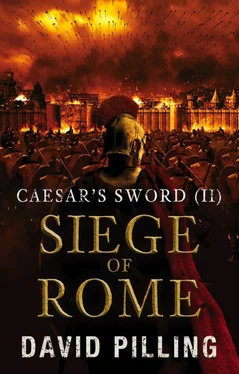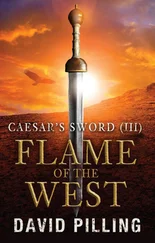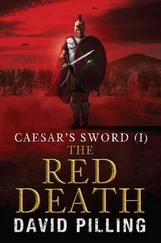David Pilling - Siege of Rome
Здесь есть возможность читать онлайн «David Pilling - Siege of Rome» весь текст электронной книги совершенно бесплатно (целиком полную версию без сокращений). В некоторых случаях можно слушать аудио, скачать через торрент в формате fb2 и присутствует краткое содержание. Год выпуска: 2013, Жанр: Исторические приключения, на английском языке. Описание произведения, (предисловие) а так же отзывы посетителей доступны на портале библиотеки ЛибКат.
- Название:Siege of Rome
- Автор:
- Жанр:
- Год:2013
- ISBN:нет данных
- Рейтинг книги:3 / 5. Голосов: 1
-
Избранное:Добавить в избранное
- Отзывы:
-
Ваша оценка:
- 60
- 1
- 2
- 3
- 4
- 5
Siege of Rome: краткое содержание, описание и аннотация
Предлагаем к чтению аннотацию, описание, краткое содержание или предисловие (зависит от того, что написал сам автор книги «Siege of Rome»). Если вы не нашли необходимую информацию о книге — напишите в комментариях, мы постараемся отыскать её.
Siege of Rome — читать онлайн бесплатно полную книгу (весь текст) целиком
Ниже представлен текст книги, разбитый по страницам. Система сохранения места последней прочитанной страницы, позволяет с удобством читать онлайн бесплатно книгу «Siege of Rome», без необходимости каждый раз заново искать на чём Вы остановились. Поставьте закладку, и сможете в любой момент перейти на страницу, на которой закончили чтение.
Интервал:
Закладка:
We started early in the morning, and arrived within sight of the Tunisian coast just before dusk. The scattered lights of Carthage lit up the dark mass of the coastline, like thousands of yellow stars gleaming in the night sky.
Belisarius called me over to his side. “There,” he said, pointing to the south of the city, “the rebel host.”
I clung to a rope and squinted at a smaller gathering of lights, several miles distant of the city. If Belisarius was right, the rebels had quit Carthage and set up camp on the desolate plains outside.
“Perhaps our soldiers in the garrison found their courage, and forced them out,” I said.
“We shall soon find out,” he replied, “I mean to sail into the harbour and announce my presence. If we are greeted with rocks and curses, then at least we shall know who holds the city.”
Our ship ghosted into the bay of Carthage. No horns or trumpets greeted our arrival, but there was no hail of missiles either. When the ship reached the chain that acted as a boom, Belisarius ordered the imperial flag to be hoisted on the mainmast, and his trumpeter to announce our arrival with several loud blasts.
Lights flared along the sea-walls that defended the harbour to north and south. I stood in the front rank of guards behind Belisarius on the foredeck, wincing as my bowels dissolved in sickness and fear. At any moment I expected the bombardment to start, and our ship to be smashed to pieces.
Instead a small boat put out from the harbour and rowed slowly towards us. A man stood up in the belly of the boat and held a lantern aloft. The light illuminated his face, showing a youthful, bearded visage, his cheeks scarred with tattoos I recognized from my time among the Heruli.
“Who are you?” he called out in a thick Germanic accent.
“General Flavius Belisarius!” replied Belisarius in his best parade-ground bark, “and you will salute a superior officer!”
The soldier’s face lit up in a grin. “General!” he cried, saluting, “thank God! We had hoped for your coming. Where is the rest of your fleet, sir?”
Belisarius threw up his hands in exasperation. “Am I a general or a schoolmaster? Every man thinks he can ask questions of me. Turn your boat around, soldier. Inform your comrades that Belisarius is here, and expects every man in the garrison to be armed and ready to ride out at dawn.”
“It could be a trap,” warned Bessas as the boat rowed back to shore, “how do we know the garrison is not in league with the rebels?”
“We don’t,” said Belisarius, “but what would you have me do? Sail around in circles until our enemies die of old age? We must act, or withdraw.”
“Coel, with me,” he added, nodding at me, “if you see anyone suspicious, wave your magic sword at them until they disappear.”
I ignored the sarcasm and clambered down the ladder into the launch behind him. There were six boats, each large enough to carry fifteen men. Belisarius stood in the prow, his fur-trimmed red cloak thrown back to display his golden helm and ornate breastplate. He had donned ceremonial armour to dispel any doubts regarding his identity.
Like Bessas, I feared that we were heading into a trap. I crouched well behind my shield, peering over the rim to look for any archers concealed among the line of soldiers waiting for us on the docks. As we drew near they clicked their heels together and held out their right arms in a military salute.
I sagged with relief. “Welcome, General Belisarius,” called out one of their officers, cupping his hands round his mouth, “we are yours to command.”
6.
Belisarius wasted no time. All through the night he worked to ready the garrison to sally out at dawn. He was consumed with nervous energy, and needed no sleep, but allowed me and the rest of his guards to snatch a few hours of rest in the barracks outside the governor’s residence.
The garrison was made up of foederati troops, most of them Herulii. When I woke, I sought out one of their officers and enquired what had passed since Solomon fled Carthage. He told me that after sacking the city, the rebels had marched out to meet their allies on the plains of Bulla, where two years previously I witnessed the Vandal host muster before the Battle of Tricamarum.
“As soon as they were gone, we ventured out and closed the gates,” said the officer, “then we raised the imperial flag on the battlements, to show that Carthage was Roman once more.”
I looked at him with contempt. “But you did nothing to protect our citizens when the rebels were running amok in the streets,” I said, “and only found your courage behind strong gates and high walls. For shame.”
He reddened, and flung up his hand. The Heruli, like all Germanic peoples, are fiercely proud, and quick to fall to blows.
I waited for the blow to fall. “Strike me,” I said calmly, “and let it be a quarrel between us. I am happy to meet you, blade to blade, on private ground of your own choosing.”
There was no-one else within earshot, otherwise he would have had no option but to accept the challenge. As it was, he confined himself to spitting at my feet, and then stalked away. Another enemy to add to the list, I thought wryly as I wiped my boot with the back of my gauntlet.
We had left our horses behind in Syracuse, but Belisarius found mounts for us in the stables of the governor’s residence. He mustered his little army on the barren ground south of the city, and harangued us just as the red orb of the morning sun rose over the hills to the east.
“Soldiers,” he cried, riding back and forth across our front rank on his bay, “our enemies are cowards, and have fled inland rather than face us like men. My scouts inform me that they have forged an alliance with the degenerate Moors, and wait for us outside the city of Membresa, some fifty miles west of here. They outnumber us four to one, and have made a private soldier named Stoza their chief. He is a Roman, like us, but has broken his fealty to God and Emperor. Are we dismayed?”
Absolutely, I thought, but along with the rest of The First Century I drew my sword and held it aloft.
“Never!” we shouted. Our voices echoed across the dusty plain, and were taken up by the garrison troops formed up behind us and on the flanks. They were all light cavalry, armed with spears and large round shields. Despite their craven behaviour during the riots, Belisarius had chosen to put his faith in them. He had no choice, since there were no other troops available: all of the neighbouring Roman garrisons had thrown in their lot with the rebels.
Belisarius led us on towards Membresa, which lay beside the banks of the River Bagrades. I had never thought to set foot on African soil again, and as we rode my mind conjured up images of what I had seen and suffered in this strange land: the mad King of the Vandals, Gelimer, cackling like a crazed old woman as he raised Caledfwlch and swore to wipe the Roman army off the face of the earth; the humiliating rout of our vanguard at Ad Decimum; the blood-soaked sands of Tricamarum, where Belisarius exterminated the last Vandal host; the hell of my captivity on Mount Papua; the weeping boils that encrusted Gelimer’s face and finally broke his will to resist. No, I had little reason to remember Africa with any fondness, and was anxious to quit the country again as soon as possible.
Belisarius knew that speed and surprise were essential to our slender chances of victory. Though we lacked remounts, he kept us at a furious pace, and our army arrived within sight of Membresa shortly after noon.
Membresa was a sprawling city, but undefended by walls, so the rebel host had taken up a strong position on a nearby hill. They were some eight thousand strong, a rag-bag of Arian heretics, Roman mutineers and Moors. Their commander, Stoza, knew his business, and had fortified his position with ditches and entrenchments.
Читать дальшеИнтервал:
Закладка:
Похожие книги на «Siege of Rome»
Представляем Вашему вниманию похожие книги на «Siege of Rome» списком для выбора. Мы отобрали схожую по названию и смыслу литературу в надежде предоставить читателям больше вариантов отыскать новые, интересные, ещё непрочитанные произведения.
Обсуждение, отзывы о книге «Siege of Rome» и просто собственные мнения читателей. Оставьте ваши комментарии, напишите, что Вы думаете о произведении, его смысле или главных героях. Укажите что конкретно понравилось, а что нет, и почему Вы так считаете.












